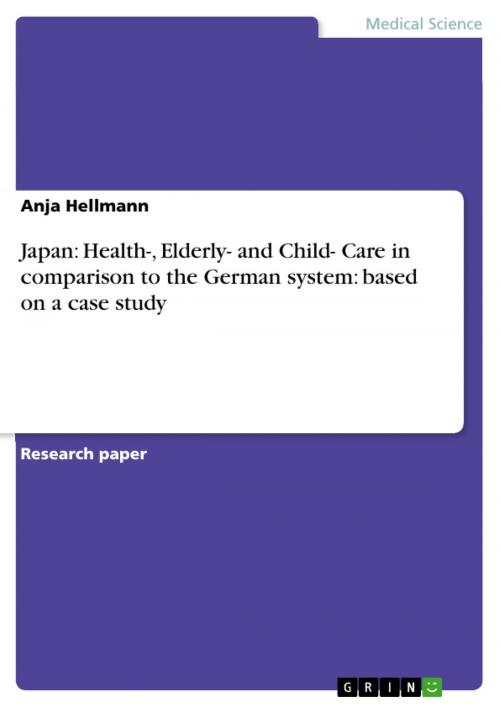Japan: Health-, Elderly- and Child- Care in comparison to the German system: based on a case study
Nonfiction, Health & Well Being, Health| Author: | Anja Hellmann | ISBN: | 9783640606559 |
| Publisher: | GRIN Publishing | Publication: | April 27, 2010 |
| Imprint: | GRIN Publishing | Language: | English |
| Author: | Anja Hellmann |
| ISBN: | 9783640606559 |
| Publisher: | GRIN Publishing |
| Publication: | April 27, 2010 |
| Imprint: | GRIN Publishing |
| Language: | English |
Research Paper (undergraduate) from the year 2009 in the subject Health Science, grade: 1,6, University of Applied Sciences Bremen, language: English, abstract: The development of the Japanese society is characterized by a lot of similarities to Germany. This is why I have chosen the country to compare especially the Health Care System with the German one. Not only the economic achievements are comparable, but first of all the Demographic Change. In 2020 28% of the Japanese population will be over 65 years. In Germany it is prognosticated to be around 21% (Tab.1). Moreover the Japanese Health Care System is known as own of the cheapest of the industrialized countries. This leads to the question of adoption of some parts or ideas from the Japanese system to the German one. In my elaboration I want to describe a case of a family in Japan regarding the family and work situation, the Health Care System in general and additionally the system of taking care of the elderly and the children. My example family has got following parts: The mother is 42 years old, she works as a nurse in an outpatient department of a local government. In addition she has to take care of her parents almost every day. The father is 45 years old, works as an engineer and likes his hobby, which is driving motorbikes. The daughter of them is 7 and their son is 13, both go to school. The grandmother has got dementia, she is 76 years old and lives together with her husband, who is 76 and has got diabetes. They live in the neighborhood of their children and grandchildren. Case 1: Values, culture, roles of the family members. Case 2: Health Care System of Japan in comparison to the German one. What happens after a traffic accident of the father? Case 3: Elderly and Child Care in general and in the case of the accident and depression of the mother.
Research Paper (undergraduate) from the year 2009 in the subject Health Science, grade: 1,6, University of Applied Sciences Bremen, language: English, abstract: The development of the Japanese society is characterized by a lot of similarities to Germany. This is why I have chosen the country to compare especially the Health Care System with the German one. Not only the economic achievements are comparable, but first of all the Demographic Change. In 2020 28% of the Japanese population will be over 65 years. In Germany it is prognosticated to be around 21% (Tab.1). Moreover the Japanese Health Care System is known as own of the cheapest of the industrialized countries. This leads to the question of adoption of some parts or ideas from the Japanese system to the German one. In my elaboration I want to describe a case of a family in Japan regarding the family and work situation, the Health Care System in general and additionally the system of taking care of the elderly and the children. My example family has got following parts: The mother is 42 years old, she works as a nurse in an outpatient department of a local government. In addition she has to take care of her parents almost every day. The father is 45 years old, works as an engineer and likes his hobby, which is driving motorbikes. The daughter of them is 7 and their son is 13, both go to school. The grandmother has got dementia, she is 76 years old and lives together with her husband, who is 76 and has got diabetes. They live in the neighborhood of their children and grandchildren. Case 1: Values, culture, roles of the family members. Case 2: Health Care System of Japan in comparison to the German one. What happens after a traffic accident of the father? Case 3: Elderly and Child Care in general and in the case of the accident and depression of the mother.















